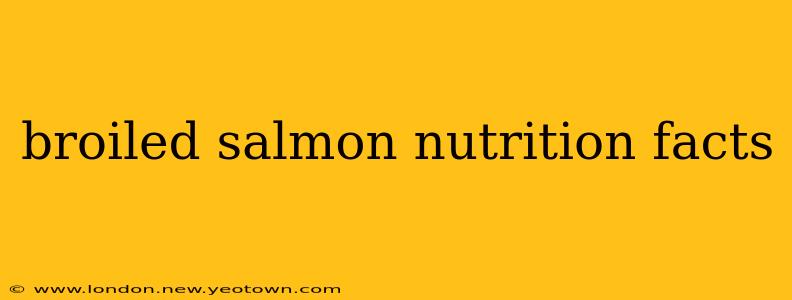Salmon, especially when broiled, is a nutritional powerhouse. Its rich flavor and flaky texture make it a favorite for many, but it's the impressive nutritional profile that truly sets it apart. This isn't just a delicious meal; it's a significant contributor to a healthy lifestyle. Let's dive into the details of broiled salmon nutrition and explore why it deserves a prominent place on your plate.
What are the Nutritional Benefits of Broiled Salmon?
Broiling salmon, a cooking method that involves direct heat from above, allows for a relatively healthy way to prepare this fish. It minimizes the need for added oils and preserves many of its valuable nutrients. Let's examine the key nutritional components:
-
Protein: Salmon is an excellent source of high-quality protein, essential for building and repairing tissues, supporting immune function, and maintaining overall health. A 3-ounce serving of broiled salmon can provide around 20-25 grams of protein.
-
Omega-3 Fatty Acids: This is where salmon truly shines. It's incredibly rich in omega-3 fatty acids, particularly EPA and DHA. These essential fats are crucial for brain health, heart health, reducing inflammation, and supporting overall well-being. Regular consumption of omega-3s is linked to a decreased risk of chronic diseases.
-
Vitamin D: Many of us don't get enough vitamin D, an essential nutrient for bone health, immune function, and mood regulation. Salmon is a good source of this vitamin, especially important during colder months when sun exposure is limited.
-
Vitamin B12: This vital vitamin is essential for nerve function, red blood cell formation, and DNA synthesis. Salmon provides a significant amount of vitamin B12, making it a beneficial choice for those at risk of deficiency.
-
Selenium: A powerful antioxidant, selenium protects cells from damage caused by free radicals. Salmon is an excellent source, contributing to overall health and disease prevention.
-
Potassium: This essential mineral is crucial for maintaining healthy blood pressure and fluid balance in the body.
How Many Calories are in Broiled Salmon?
The calorie count in broiled salmon varies slightly depending on the size of the portion and preparation method. However, a typical 3-ounce serving of broiled salmon contains approximately 150-200 calories. This makes it a relatively low-calorie, high-protein option for weight management.
Is Broiled Salmon Good for Weight Loss?
Yes, broiled salmon can be a valuable part of a weight loss plan. Its high protein content promotes satiety, keeping you feeling full and satisfied for longer periods. This can help reduce overall calorie intake and support weight management goals. Furthermore, the omega-3 fatty acids in salmon may also play a role in metabolism and fat burning.
What are the Potential Health Risks of Eating Broiled Salmon?
While generally safe and beneficial, there are a few things to consider:
-
Mercury Content: Some types of fish, including salmon, can contain mercury. However, the levels in salmon are generally low and unlikely to pose a significant risk for most people. Choosing sustainably sourced salmon can further minimize potential mercury exposure.
-
Allergies: Salmon, like other fish, can cause allergic reactions in some individuals. Those with known fish allergies should avoid consuming it.
-
Bone Fragments: When preparing broiled salmon, take care to remove any potential bone fragments to avoid any injury or discomfort.
How Much Broiled Salmon Should I Eat Per Week?
Dietary guidelines recommend eating at least two servings of fatty fish, like salmon, per week to reap the benefits of omega-3 fatty acids. However, individual needs may vary, and it's always best to consult with a healthcare professional or registered dietitian for personalized recommendations.
Is it Better to Bake, Grill, or Broil Salmon?
While baking, grilling, and broiling are all healthy cooking methods, broiling offers the advantage of quicker cooking times and a slightly crispier exterior. The choice ultimately comes down to personal preference and available resources. All three methods retain much of the nutritional value of the salmon.
Broiled salmon offers a delicious and nutritious meal option. Its rich nutritional profile supports various aspects of health, making it a worthy addition to a balanced diet. Remember to choose sustainably sourced salmon and prepare it safely to maximize its benefits.

